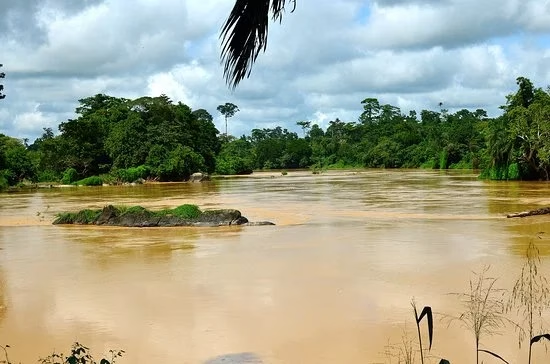The Birim River at Anyinam has reverted to its polluted state just four days after the government’s Operation Halt attempted to clear out illegal miners. This operation, which deployed over 100 armed military personnel to various water bodies, aimed to eradicate galamsey, the local term for illegal mining activities.
Despite initial successes, including the seizure and burning of three changfan machines on the Birim River’s banks on October 10, the river’s pollution persists. The Birim River is a vital water source that has suffered extensively from illegal mining, prompting swift government action.
The military-led task force targeted Anyinam, a notorious hotspot for illegal mining in the Eastern Region’s Atiwa East District. Organized Labour’s opposition to galamsey led President Nana Addo Dankwa Akufo-Addo to direct the Defence Minister to deploy additional military forces to strengthen Operation Halt.
Operation Halt’s efforts extended beyond Anyinam, with the task force destroying 10 changfans, a pistol, and eight water-pumping machines on the Pra River in the Central Region on October 11. These actions demonstrate the government’s commitment to combating galamsey.
However, the persistence of pollution in the Birim River raises concerns about the effectiveness of these measures. Researchers have highlighted the challenges in formalizing artisanal small-scale mining (ASM) in Ghana, citing inadequate regulations and enforcement.
Studies suggest that military interventions, while well-intentioned, often result in casualties, brutality, and human rights abuses, ultimately failing to deter miners. The use of military force has been criticized, with some advocating for alternative approaches, such as providing incentives and support for formalization.
Ghana’s experience with ASM is complex, with the sector contributing significantly to the country’s gold production and rural livelihoods. However, the environmental costs, including water pollution and land degradation, cannot be ignored.
To address these challenges, experts recommend a multifaceted approach, including policy interventions, community engagement, and strengthening regulatory frameworks. By acknowledging the complexities of ASM, Ghana can work towards a more sustainable and equitable solution.
The government’s efforts to combat galamsey are ongoing, with Operation Halt being the latest initiative. While progress has been made, the continued pollution of the Birim River underscores the need for sustained commitment and innovative solutions.
Balancing economic benefits with environmental and social responsibilities is crucial for Ghana’s long-term development. By prioritizing sustainable mining practices and supporting affected communities, Ghana can mitigate the negative impacts of galamsey and ensure a brighter future

